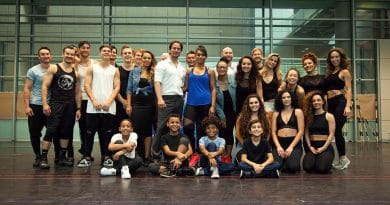Diversification in the Entertainment Industry with Corinne Grant
In economics, diversification is a technique to lower risk. It aims to spread risk of failure by having a wide range of investments in a portfolio. That means if one investment fails, you have something to rely on. When discussing professional diversification, I don’t mean you should go all Gina Liano and bring out a perfume range stocked exclusively at Chemist Warehouse, which smells like a girl named Kay-lah with personalised number plates. I mean, learn new skills to expand yourself professionally. It will provide you with more work opportunities and happiness via creative fulfilment.

This is SO relevant for the Entertainment Industry where contract work is the norm and therefore unemployment is inevitable. We can maximise employment by having a wide range of skills or strings in your bow – by not putting all our eggs in one basket. The 1 in 10 WAAPA grad that can dance, will always work more than the other 9 who can barely walk. (My bitey tone can be read as being bitter AF that I didn’t get in……twice)
Psychologically, learning is closely associated with happiness because the human brain LOVES variation. When an activity is meaningful and completely absorbing in and of itself, it is called ‘autotelic’- or a being in a state of flow. Psychologists have observed that when people are completely absorbed in something they’re doing, it promotes healthy changes in the brain and respiratory patters.
To derive these benefits, a task must be sufficiently difficult to really challenge us. This is called the ‘just manageable difficulty.’ The problem is when we start to habituate to something (like say on a 14 month contract), how do we continue to challenge our minds?
Corinne Grant studied a Bachelor of Arts majoring in Drama at LaTrobe in Melbourne before trying her hand at stand up comedy. Her first proper stand up gig was supporting Merrick Watts of Merrick and Rosso. Shortly thereafter, Rove McManus asked her to join him on the show Rove Live on Channel 10. She then hosted The Glasshouse with Wil Anderson and Dave Hughes. Corinne is an accomplished stand-up, MC, presenter, writer and broadcaster and has performed both nationally and internationally. She has appeared on Spicks and Specks, Dancing with the Stars, Good News Week and has recently finished her Juris Doctor in Law and is now a practicing Lawyer.
For Corinne there has always been two things: Comedy and Social Justice. Her career is incredibly diverse, but has always challenged her creatively. Below are her thoughts on professional diversification in the Entertainment Industry.
Take a risk
Corinne’s comedy career came about through taking a chance, and look where she’s ended up. “I started standup because it looked like the best way to deliver tightly descripted material in the most natural way. It was an acting exercise when I was at university, a good way to get over stage fright (not that I ever had a lot). I started to get paid and it just took off.”
Acquire new skills
“Any new workshop you can do, i.e. Equity workshops in comedy, comedy acting, accents etc., in an area you’re not familiar with will help. Diversification is what everyone needs to do. The same goes for straight actors, if they want to do workshops in accents or singing etc. Wherever you can add an extra skill, you never know where a job will pop up.”
Collaboration leads to diversification
Collaborations provide both inspiration and opportunity. “Rove, Peter Helliar and I all started around the same time. We were all on the circuit together and all knew each other. Comedy is a very collaborative industry, even though you all work separately, we would collaborate in different groups and come up with ideas. Later on, Rove has a show on Channel 31, and was approached by Channel 9 to do the show on a late night slot. He asked Pete Helliar and me to join him. I’d been in the biz for 4-5 years by then.”
Passion motivates diversification
I asked Corinne about what motivated her move from Comedy into Law – boredom, passion or necessity? She said, “I’d always had 2 strings to my bow. One was my creative and artistic pursuits, which manifested in comedy, and the other was always a strong bent towards social justice causes and donating back whatever skills I had to my community. Over time, that became more focused on refugees and asylum seekers around the time of Tampa in 2000. For 17 years, I’ve been doing that advocacy work, and it got to a point where I wanted to do more than introduce the people on stage who were making a difference, I wanted to make a difference myself. It’s more like I’m monetising a different part of my life now. I still do charity MC roles here or there or corporate work, or write an article, but law is more fun for now.”
Don’t sell yourself short – think big!
Lots of performers don’t trust that they have any skills beyond their singing voice or acting skills. Corinne disagrees! “Any performer undersells that they have a lot more confidence when it comes to standing up in front of the general public, even if you are nervous, you are still able to marshal your nerves in a way that most people cannot. That translates quite well to dealing one on one with clients as well. The same skills are used one on one as used with an entire audience. As a musical theatre performer, you know what cog you are in the wheel and you know how to take direction. You’d be surprised how many people can’t do that. That’s a REALLY important skill, not to talk back and just do the job you’re assigned. It shocks me to see people screw up their nose.”
Don’t take jobs out of fear – make your own work
“The good thing about standup is that you can always create your own work. I‘ve had hairy moments, but always the confidence in myself that I’d find my way through it. It’s important for performers, especially females, to back their own ability to withstand the pressure and uncertainty on the work. If you’re smart enough to get yourself some sort of qualification as an actor, or a job as a performer of any description, then you’ll never end up in the gutter. That helps you not take jobs out of fear, and helps you to sleep at night too.”
Diversifying is not flakey
“It’s not that I’ve never stuck with one thing, I’ve just taken opportunities which have come my way. There has always been two things in my life: performing and social justice, and I’ve never veered from either of them.”

Work for artistic fulfilment
Corinne always followed the need for creative fulfilment: “I don’t know how I’ve managed to get this far without any long-term goals, I’m not one of those people. I’m not Oprah! I just take work based on what I think I’ll be interested in and what will fulfil me creatively and that’s the way I’ve always done it, and that’s what means I’ve diversified. I’ve written a book, hosted shows, done voice-overs, acting – a whole bunch of different things. Treating it as a creative exercise and part of my artistic fulfilment instead of goal setting and fulfilment means I’ve enjoyed it more.”
On the move from Comedy to Law: “It’s less that I have drastically changed what I am doing, but have directed my skills and values and what I enjoy about working in a different area.” To Corinne, work should be chosen based on what will stimulate your creativity and serve your passion. For example, “The Glass House was about current affairs and news (even if they were troubling) and finding the absurdities in them. And everyone can laugh at that! It makes the news less frightening and intimidating, and you’re more likely to change people’s hearts and minds that way; as opposed to ridiculing voters or calling people stupid, I see people tune out.”
Don’t be scared to diversify – you are not your work
There is always a risk in doing something that you’re not entirely comfortable with. This shouldn’t stop you from perusing diversity. “You’ve got to be able to separate your own personal self from professional self. When I go on stage, I’m taking Corinne Grant the comedian on stage, not Corinne Grant on stage. They’re never going to hate me; they may hate what comes out of my mouth, but that doesn’t mean I’ve written a terrible joke. If you allow yourself to take your full self-worth on stage, you’ll get very bruised.”
Diversification risk is harder for women – but get it done
“Women are not taught that we’re self reliant – we don’t have as many role models in that world as men do. Although there are more now, women always wonder if they can do it alone. One step at a time! Having it all is a ridiculous extra pressure to put on yourself. “ This issue isn’t specific to the Entertainment World. “Comedy isn’t any more or less difficult than anything else. The same problems arise in every industry. You can either focus on that or get the job done. “
Diversification is easier now than ever before
“I did performing for almost 25 years, and the only reason I’ve swapped in the end is because I felt a bit of artistic groundhog day – everything was slight variation on something I’d already done. I’m one of the first generation of women that can have 2 careers in one lifetime, so why the hell not? It’s like living two lives. The attraction of Social Justice and Law picked up on lots of the things I enjoyed doing in Entertainment – teams, communication skills, problem solving skills, and seeing projects through to fruition.”




